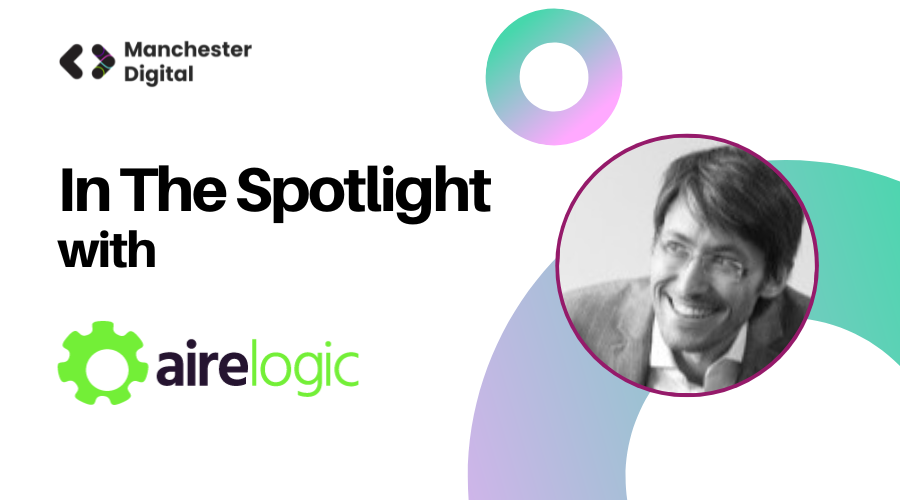
At Manchester Digital, we like to interview our members to find out a bit more about what they do and their work in the Greater Manchester digital and technology sphere. This week, we're speaking with tech4good specialist, Joseph Waller from Aire Logic.
Please introduce yourself …
Joseph Waller. I normally refer to myself as a HealthTech specialist. Although recently (the last 3 years) the company has been diversifying so would these days say tech4good specialist.
Congratulations on achieving your B-Corp certification! How does this certification align with your company's overall mission and values?
Thank you! This has been a goal we've been working towards for some time, and achieving our B-Corp certification marks a significant milestone that aligns closely with our mission and values.
From the beginning, we've been dedicated to operating in a way that not only drives success but also prioritises the wellbeing of AireLogic employees, our local communities, and the environment.
This certification is a reflection of our commitment to sustainability, ethical practices, and community engagement. It reinforces our belief that businesses should be a force for good and highlights our efforts to balance purpose with value. It’s a crucial step in our journey toward responsible growth and meaningful impact, ensuring we uphold the highest standards of social and environmental performance while maintaining accountability.
We are looking forward to the opportunity to develop relationships with like minded businesses and suppliers.
While still being a commercial company that needs to take commercially minded decisions, our ethics are hugely important to us. Our future is a successful, socially progressive company in which staff decide whether to spend the profit on their bonus, more social value work, research and innovation or commercial efforts like growth and acquisitions. I think that places us right in the heart of the B Corp movement's aims.
Can you share examples of initiatives and projects that you've undertaken to create a positive social and environmental impact?
Well, if we wrote all our projects on post it notes and stuck them on a wall, you could spend a year throwing darts at it and you wouldn't hit a project that didn't provide "a positive social and environmental impact". However, notable examples include: our long relationship with Leeds Teaching Hospital building their patient record. Through a combination of Aire Logic software delivery teams and the use of part of our low code platform, we've saved tens of millions for the region. Possibly stretching into the hundreds.
But then we do loads of really rewarding smaller projects, many of which are what we call "not-for-profit" and innovation projects. These are either research collaborations with Universities or projects and startups we have supported or funded in some way because, while they're not likely to make a profit, they bring benefits to patients or citizens. An example of the former is a collaboration with Manchester University to create an App that can help diagnose and monitor Parkinson's disease and Multiple sclerosis. An example of the latter include building the platform which The Lancaster Model sits on. Our technology assesses school pupils and predicts which are likely to get into difficulty with their behaviour, health or mental health. The Lancaster Model team then work with schools and local authorities to introduce preventative measures, ensuring reducing the instances of these negative outcomes.
How do you involve your employees and stakeholders in your B Corp journey?
To be honest we had to change very little as part of the B Corp assessment, although we did need to improve some of our measurement mechanisms. We're a low hierarchy company so all of our endeavours outside paid projects are still led by the staff base. We have a Staff Council and annual staff survey which makes critical decisions for the company and helps set direction alongside an operations team as well as staff led special committees for areas like Carbon Reduction, EDI, etc.
What steps do you take to ensure transparency and accountability in your business practices?
Internally we report far more of our information to our employee owners than most companies with quarterly financial updates and a hugely open culture for asking questions and debating issues. Our anonymous "silly questions" Slack channel provides a great way to ask challenging questions without worrying about recourse.
What is your approach to understanding client needs and tailoring solutions to their specific requirements?
At Aire Logic we use a combination of User Centred Design (UCD) and Agile Delivery. At first glance, the question of how Agile delivery and User-Centred Design (UCD) coexist might seem straightforward, but there are some fascinating dynamics hidden beneath the surface. Over the last 20 years, Agile has become the dominant approach to delivering IT systems. Meanwhile, UCD—widely recognised as the best method for understanding user needs—has only gained significant traction in the UK public sector in the last decade. However, a challenge that often goes unspoken in both public and private sectors is the inherent tension between Agile delivery and UCD.
It’s important to recognise that Agile and UCD are not opposites; rather, they complement each other in meaningful ways. While both development processes share the same goal of creating user-centred services and products, they approach this goal from different perspectives. From a UCD standpoint, it is essential that end-users can easily and efficiently achieve their goals, whether or not they are using software, ensuring a positive user experience and minimising high levels of maintenance and cost in the future. On the other hand, Agile thrives on incremental delivery, where efficiency and quality are achieved by releasing software in stages. A cornerstone of Agile is the Minimum Viable Product (MVP), which delivers just enough functionality for users to accomplish their tasks.
A key challenge in integrating Agile and UX design is synchronising their activities and practices throughout all development stages. This challenge can be addressed by effectively combining UCD and Agile through Lean UX methodologies. Lean UX breaks projects into short, rapid cycles, integrating research findings, design, and development early, with continuous testing and improvements throughout the process. This approach ensures better alignment and collaboration between teams while maintaining a user-centred focus.
One of the great strengths of Agile is its flexibility. If a developer finishes a task early, they can simply move on to the next item in the backlog, making the process highly efficient. However, UCD’s Discovery phase often has fixed budgets and timelines, particularly in large projects where different vendors handle distinct project stages. When this happens, Discovery can become bloated—spending too much time refining requirements that would be better addressed in real-world use. This can unintentionally impose a more traditional, Waterfall-like approach on the project, wasting both time and resources.
At Aire Logic, we emphasise the importance of selecting appropriate development methodologies from the outset while minimising the impact of the handover process to ensure project success. By incorporating user feedback earlier and more frequently during the Discovery phase, we ensure a seamless transition to the next into the next phases, such as Alpha, Beta, and Live, transforming it into a continuous development process instead of a distinct stage requiring extensive handovers. With strong communication and trust, even large projects involving multiple vendors can benefit from a flexible approach. Discovery phases should be prepared to wrap up early if possible, or pivot to other parts of the system if early completion is achieved. Development teams should be ready to start on future roadmap items ahead of schedule, and users should be educated to expect MVPs that will evolve over time.
At Aire Logic, we prioritise open, transparent discussions with our clients about project requirements and time constraints. Understanding and managing these challenges is essential to applying the right methodologies that enable the delivery of a solution that meets both functional needs and budget constraints.
After all, time and money are the ultimate sensitivity points in any project, and too many consultancies overlook these critical factors.
If you could pick one main thing you hope to gain from this community, what would it be and why?
We'd love to get more tips on how to improve our social value work further. For example, we are currently investing in wind and solar farms as part of our drive to go carbon neutral. We are also looking at carbon offsetting but we know that to do this properly you really need to own the land and plant the trees yourself and do this in a manner that will be permanent. We'd love to learn from others that have already done this and the B Corp community is just the sort of place we'll find such like minded companies.
Thank you Joseph! Learn more about Aire Logic here









